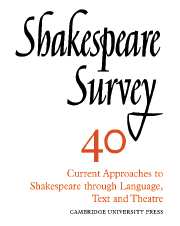Book contents
- Frontmatter
- Reconstructing Shakespeare, or Harlotry in Bardolatry
- Playing Shakespeare
- Take me to your Leda
- Sign Theory and Shakespeare
- Time in Richard III
- New Concepts of Staging A Midsummer Night’s Dream
- Henry V as Working-House of Ideology
- Shakespeare and his Sources: Observations on the Critical History of Julius Caesar
- The Speculative Eye: Problematic Self-Knowledge in Julius Caesar
- Learning by Talking: Conversation in As You Like It
- Measure for Measure: Mirror for Mirror
- Allegory and Irony in Othello
- Cruelty, King Lear and the South African Land Act 1913
- The Rationale of Current Bibliographical Methods: Printing House Studies, Computer-Aided Compositor Studies, and the Use of Statistical Methods
- Shakespeare’s Late Plays at Stratford, Ontario
- Shakespeare Performances in London, Manchester and Stratford-upon-Avon 1985–6
- The Year's Contributions to Shakespearian Study 1 Critical Studies
- 2 Shakespeare’s Life, Times, and Stage
- 3 Editions and Textual Studies
- Index
The Rationale of Current Bibliographical Methods: Printing House Studies, Computer-Aided Compositor Studies, and the Use of Statistical Methods
Published online by Cambridge University Press: 28 March 2007
- Frontmatter
- Reconstructing Shakespeare, or Harlotry in Bardolatry
- Playing Shakespeare
- Take me to your Leda
- Sign Theory and Shakespeare
- Time in Richard III
- New Concepts of Staging A Midsummer Night’s Dream
- Henry V as Working-House of Ideology
- Shakespeare and his Sources: Observations on the Critical History of Julius Caesar
- The Speculative Eye: Problematic Self-Knowledge in Julius Caesar
- Learning by Talking: Conversation in As You Like It
- Measure for Measure: Mirror for Mirror
- Allegory and Irony in Othello
- Cruelty, King Lear and the South African Land Act 1913
- The Rationale of Current Bibliographical Methods: Printing House Studies, Computer-Aided Compositor Studies, and the Use of Statistical Methods
- Shakespeare’s Late Plays at Stratford, Ontario
- Shakespeare Performances in London, Manchester and Stratford-upon-Avon 1985–6
- The Year's Contributions to Shakespearian Study 1 Critical Studies
- 2 Shakespeare’s Life, Times, and Stage
- 3 Editions and Textual Studies
- Index
Summary
In many respects the change in our approach to Shakespeare's text brought about by the 'new bibliography' of A. W. Pollard, R. B. McKerrow, and W. W. Greg can be compared to the scientific revolution initiated by Copernicus, Galileo, and Newton. Since the advent of these giants the strictly analytic method of inquiry, whether applied to Shakespeare's texts or to the world in general, has become the dominant principle.
Galileo Galilei, the father of modern science and thus also the father of analytical bibliography, was the first to use a mathematical description of nature. In order to make it possible to describe nature in these terms, he demanded that scientists should restrict themselves to studying only those properties which can be measured and quantified. His postulate was to measure those things which can be measured, and ultimately to make measurable all other things which originally were not measurable.
This approach, which has become the dominant principle of scientific examination, and of scholarly analysis emulating science, has proved extremely successful. Recently, however, not only eminent psychologists, such as R. D. Laing, but also physicists, such as Gary Zukav, Herbert Pietschmann, and Fritjof Capra, have begun to voice critical warnings. They maintain that our obsession with measurement and quantification has changed our ideas of reality and truth, and thus ultimately our world, since properties which cannot be measured (values, for example, such as aesthetic ones, or feelings) tend to be regarded as less 'real'.
- Type
- Chapter
- Information
- Shakespeare Survey , pp. 145 - 154Publisher: Cambridge University PressPrint publication year: 1988

